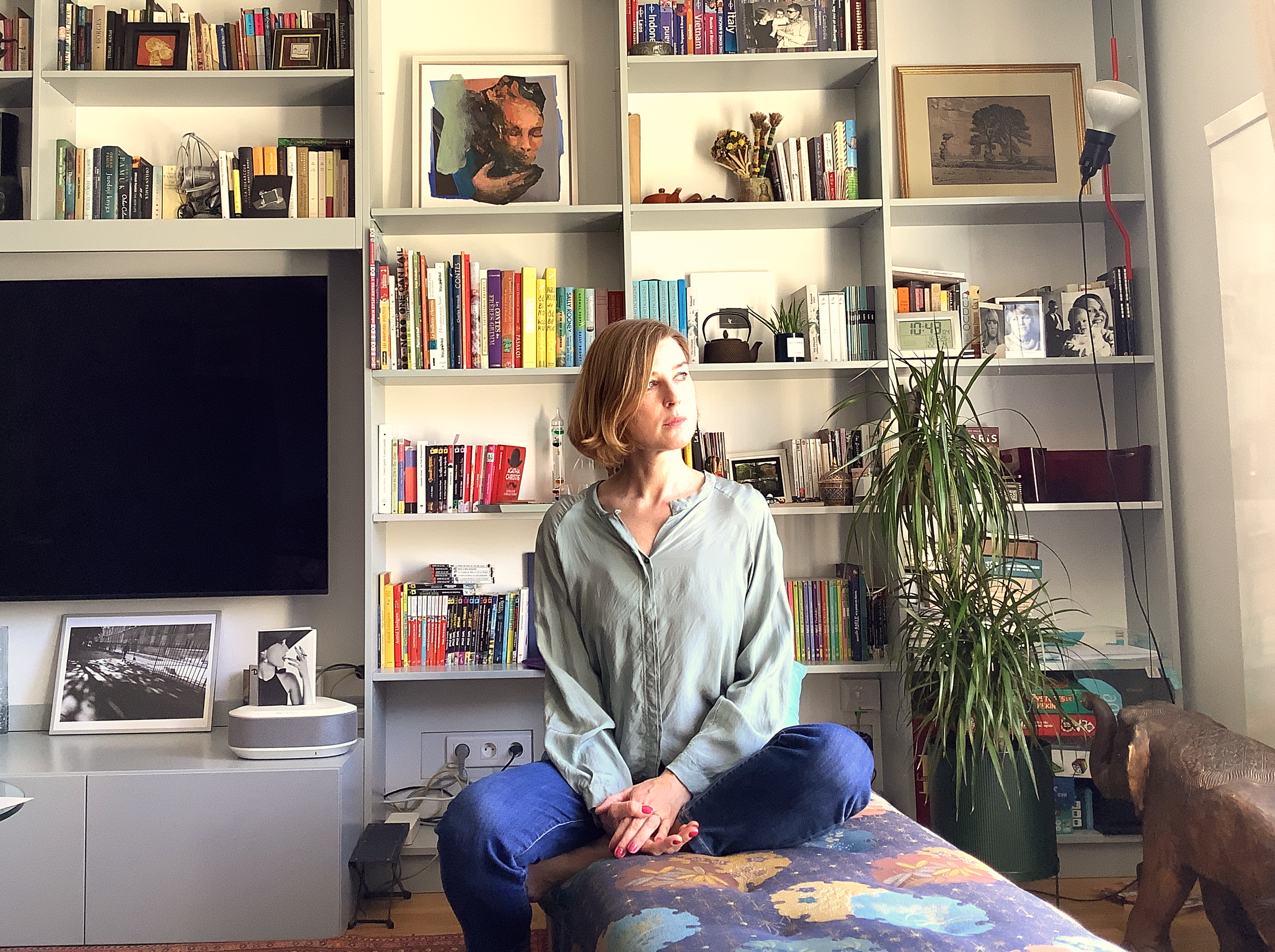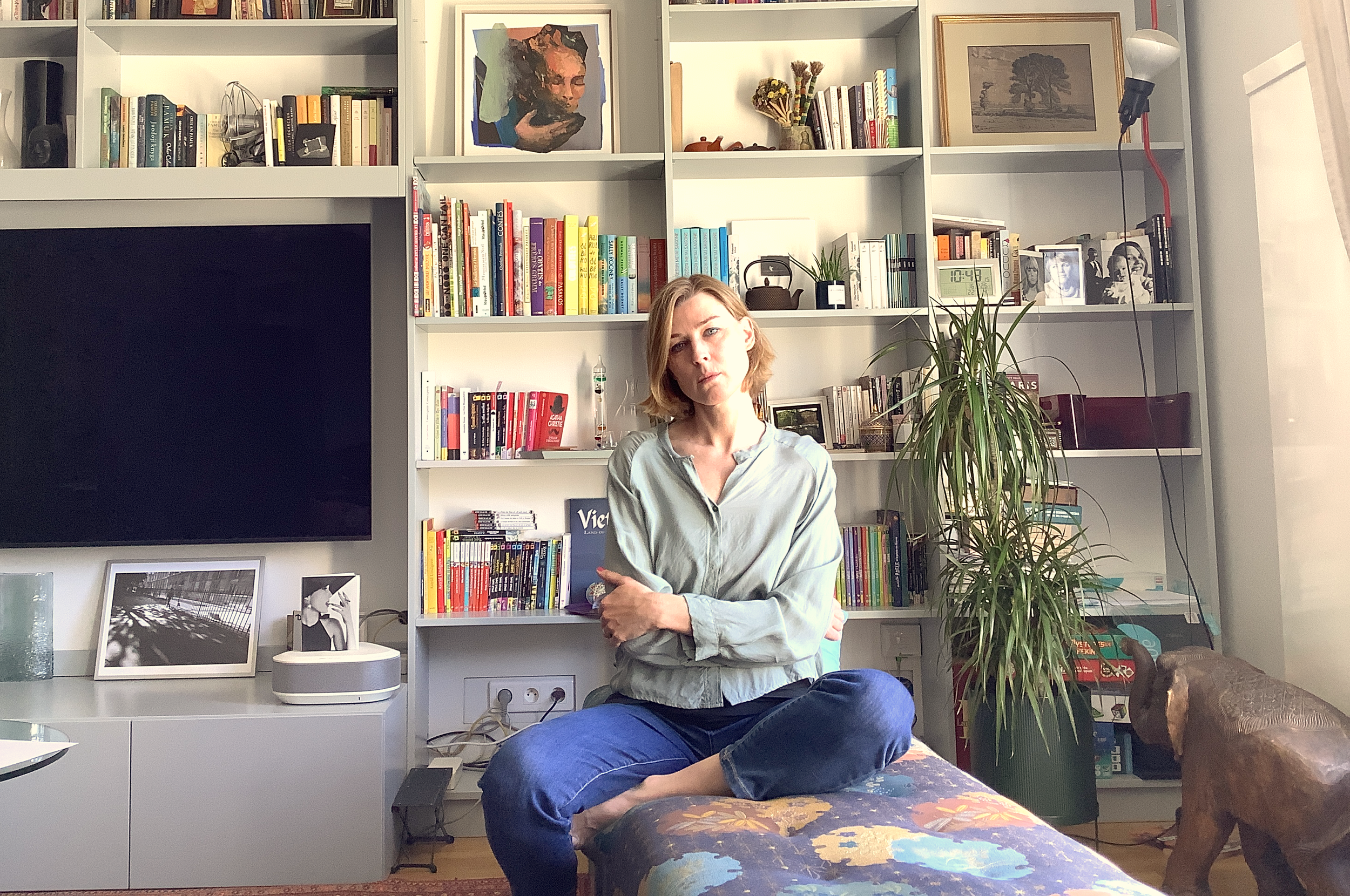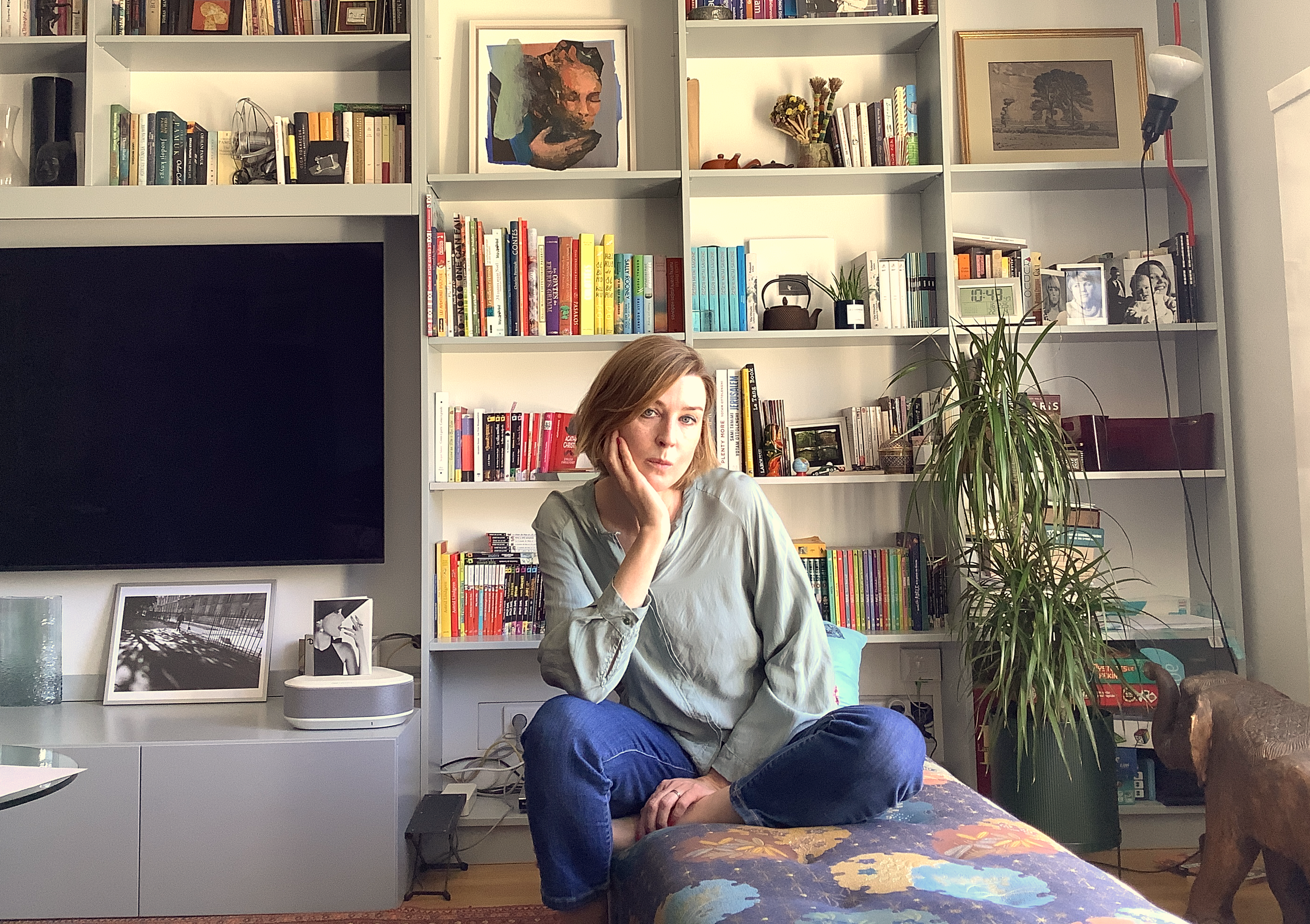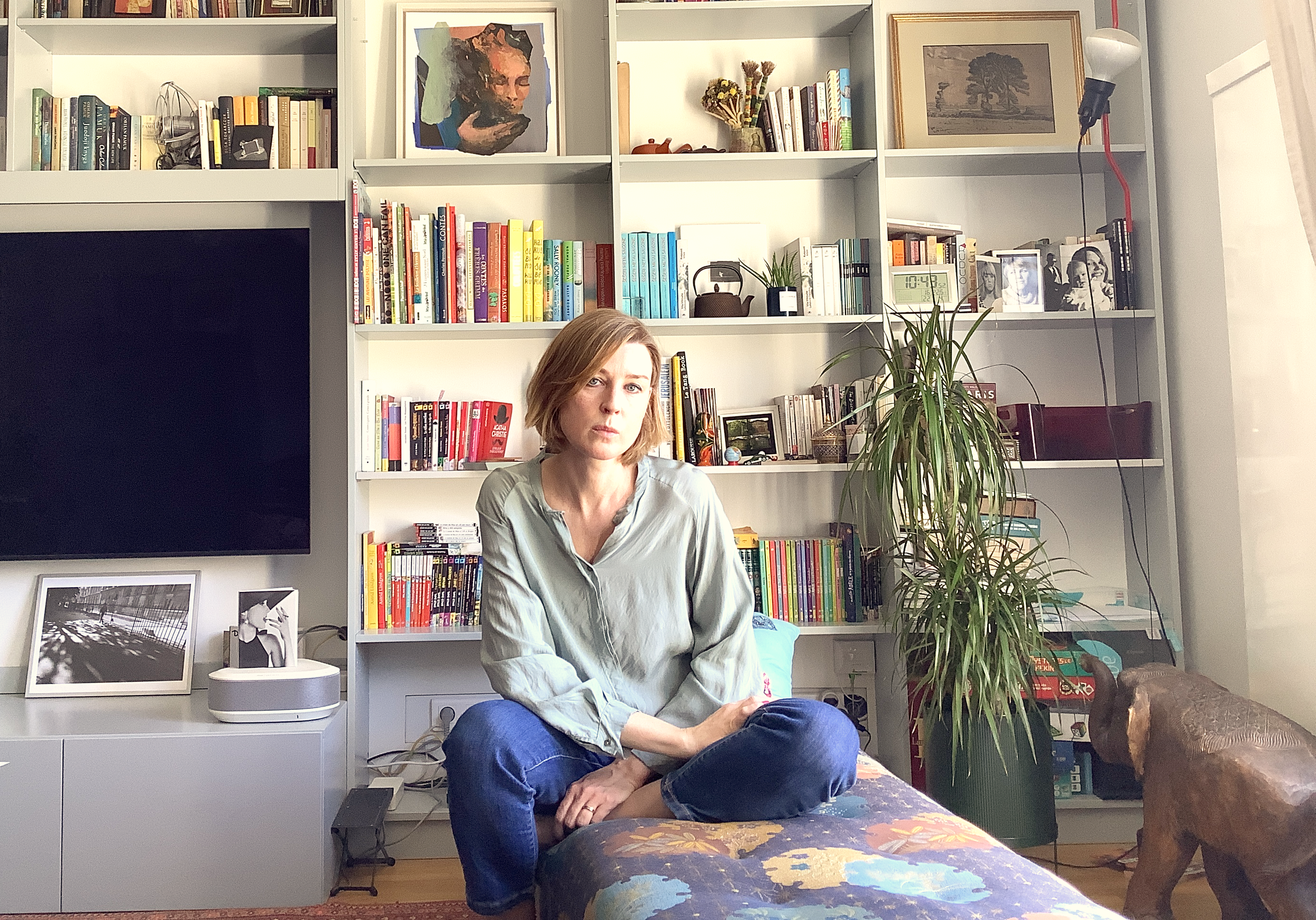Vita Vilimaite Lefebvre Delattre: Judėdami visada atrandame (we discover when we move)
Virtual photoshoot by Evelina Kvartunaite
Kaip pristatytumėte save?
Esu dukra, mama, žmona, draugė. Žurnalistė ir rašytoja. Pasaulio gyventoja.
Kokia veikla užsiimate? Kas jums svarbu asmeniniame gyvenime bei kas liečia karjerą? Kokias vertybes išskirtumėte?
Virš dvidešimt metų dirbu žurnaliste: spaudoje, televizijoje. Kai jaunystėje reikėjo pasirinkti profesiją, ilgai nemąsčiau, kuo noriu būti, nusižiūrėjau nuo mamos, kino kritikės ir žurnalistės. Man patiko jos gyvenimo būdas, dienos, visada skirtingos, judesys, triukšmas, profesinis adrenalinas, ir kartu daug tylos, skaitymo, mokymosi, smalsumo. Niekada nebijojau žmonių, norėjosi kuo daugiau jų pažinti, o tam knygų (skaityti išmokau irgi iš mamos, ji turėjo įspūdingą biblioteką) nepakako. Be to, visada atrodė, kad žurnalistika gali pakeisti pasaulį, sujungti žmonės, jaučiau prasmę būti tuo tarpininku. Kai kažkas tau patiki savo gyvenimą, tai yra didelė atsakomybė, bet kartu ir garbė, dovana.
Ypač krizių, karo metais matau žurnalistikos prasmę – žurnalistai, kartais rizikuodami gyvybe, pasakoja žmonėms apie tai, kas iš tiesų vyksta. Galbūt (knygų) rašymas yra tęstinė žurnalistikos dalis, bent jau misija tarsi tokia pati – per istorijų pasakojimą sujungti žmones, matyti, išjausti bendrumus, o ne skirtumus, stumti žmones iš komforto zonos, pasakoti apie tai, apie ką šiaip kasdien nesikalbame.
Kaip rašytojai, buvo sunku „atsikratyti“ žurnalistinio informacijos pateikimo būdo, atsiverti, apsinuoginti. Šiuo metu dirbu LRT portalui, šiaip daug ką rašau, žiūrėsime, kas dar iš to išeis. Kai nerašau, tai skaitau. Man labai svarbu nemeluoti. Tiek tiek šeimoje, tiek sau pačiai, tiek gyvenime.
Kokie keliai jus atvedė į Prancūziją? Kur gyvenate ir galbūt gyvenote prieš tai?
Iš Lietuvos išvažiavau įsimylėjusi vyrą, prancūzą, kurį sutikau Vilniuje draugų kompanijoje. Nusekiau paskui jį į Vietnamą, Saigoną, ten praleidau įsimintinus šešerius metus – keliaudama, dirbdama, atrasdama, prarasdama. Ten pradėjau rašyti savo publicistinę knygą „Šešeri metai Saigone. Nepamirštamas gyvenimas Vietname“. Saigone išsiskyriau, bet ir sudariau kitą sąjungą: sutikau savo būsimą vyrą Eriką, irgi prancūzą. Jis pirmasis vyras, kuris nieko nenorėjo manyje pakeisti, o iškart priėmė mane tokią, kokia esu – kaip už tokio neištekėjus? Aišku, tai buvo didelė meilė. Saigone gimė mano dukra Sofija. Kai vyro kontraktas baigėsi, persikėlėme į Prancūziją, kuri, beje, niekada nebuvo mano svajonių šalimi, net nežinau, kodėl. Gal dėl kalbos ir prancūzų filmų, kurių nemėgstu, išskyrus kinorežisieriaus François Truffaut.
Kaip palygintumėte savo gyvenimo kokybę Lietuvoje su gyvenimu užsienyje? Ko pasiilgstate būdama užsienyje? Kaip pasikeitė požiūris į Lietuvą bei lietuvius, pradėjus gyventi užsienyje?
Nemėgstu lyginti. Tiesiog bėga laikas, viskas keičiasi, taip ir turi būti. Lietuva yra šalis, kurioje visada jaučiausi gerai, savo vietoje, į kurią traukia sugrįžti, kurioje gyvena mano mylimiausia šeima, patys geriausi draugai, kuriais didžiuojuosi ir apie kuriuos pasakoju savo draugams prancūzams pakylėtu tonu. Man buvo trylika, kai mes tapome nepriklausomi, visi kartu kūrėme naują šalį. Galėčiau sakyti, kad kartais mums pritrūksta pagarbos žmogui, empatijos, suvokimo, kad turime susitarti tarpusavyje tam, kad išloštų visi, bet mes greitai mokomės. Dabar, kai vyksta karas Ukrainoje, dar labiau didžiuojuosi lietuviais – sunkią akimirką, jie sugeba mobilizuotis, padėti kitiems, dalintis. Visada „sergu“ už Lietuvą, rašau apie lietuvius, kurie ją myli, nesvarbu, kur jie gyvena. Pamenu, kartą Honkonge išgirdau vyrą gatvėje – jis kalbėjo lietuviškai telefonu. Vos neapsiverkiau. Nesvarbu, kaip gerai besijaustum svetur, niekada ten nebūsi savas. Aišku, grįžęs pas savus kartais irgi pasijunti svetimas. Bet tai nieko tokio. Tik nuo tavęs priklauso, kaip susitvarkysi su tokia būsena.
Nežinau, ar man pavyko, bet ji man tinka, ji mane praturtino. Manau, nepritapimo jausmas atsiranda ne tik dėl to, kad gyveni kitoje šalyje. Svetima erdvė tik paaštrina jau egzistuojančius dalykus. Tenka pažvelgti į save iš naujo, perkurti ryšius, rasti savo vietą.
Galbūt rašydama romaną „Kvėpuoti kitais“ apie moterį, kuri jaučiasi svetima, vieniša, atstumta, nepavykusi, kažko besitikinti iš aplinkinių, bandanti įsikibti į kitus, per juos kabintis į naują jai aplinką, tikrai aštriau įsigyvenau į skirtumą tarp „savas“ ir „svetimas“, jis man „įlindo” į odą. Kita vertus, suvokiu, kad nepaisant skirtingų socialinių aplinkybių, žmonės visur yra panašūs ir mano herojė, stebėdama pasaulį it koks misteris Riplis, aštriai tai pamato. „Savumo“ ar „svetimumo“ sąvokos tikrai paslankios. Galima jaustis „svetima“ ir „atstumta“ bet kurioje visuomenėje, sistemoje, ypač, jei žmogus itin jautrus. Savo knygos veikėjus apgyvendinau vidurinės klasės paryžietiškame sociume. „Jei pažįsti vieną vidurinės klasės prancūzą, pažįsti juos visus“, – taip sako mano romano veikėja. Sociumo kaukės – tam tikra savigyna, bandymas išlikti. Kaukės yra sunkios, nenuplėšiamos. Vidurinės klasės prancūzui būdingas „atkaltas” mandagumas, tam tikra kalbos maniera. Ryškus privalomas etiketas bei nuožmus abejingumas, kurį iš karto pajunti, jei neatitinki jų nerašytų standartų – nesvarbu, esi vietinis ar užsienietis. Vyrai iš gerų šeimų renkasi moteris iš gerų šeimų, kurios moka rengtis, kalbėti, telpa į tam tikro dydžio drabužius ir vyrams per daug neprieštarauja, net jei irgi išlaiko šeimą. Pasaulis irgi toks – su savo nerašytomis taisyklėmis, kurioms nenusižengiama, suvaidintu politkorektiškumu, mandagumu. O kam iš tiesų rūpi kitas? Svarbiausia, kad mūsų tai neliestų.
Jeigu sako, kad knyga keičia ir patį autorių, tai ją parašiusi dar stipriau įsikibau į savo šaknis, į tai, kas esu, iš kur esu ir nieko nesitikiu iš aplinkinių. Būdama savimi, radau aplinką, kuri man patinka, kuri yra man labai artima. Nematau skirtumo tarp draugių Vilniuje ar Paryžiuje, jas skiria nebent kalba, šiokie tokie kultūriniai niuansai, bet esmė visur yra ta pati, jausmai visur yra tokie patys. Džiaugiuosi dienomis – tokiomis, kokios jos yra, mėgaujuosi aplinka, kurioje esu.
Kokios jūsų svajonės verčia jus judėti į priekį?
Dažniausiai gyvenime viskas nutinka kitaip, nei įsivaizdavome, todėl pernelyg įsisvajoti nemėgstu. Į priekį verčia judėti smalsumas.
Iš kur semiatės įkvėpimo?
Gyvenimas, žmonės yra didžiausias įkvėpimas, dovana. Kaip gera būti tarp žmonių, apskritai čia būti, jausti, patirti, gera džiaugtis, kentėti, išgyventi sunkumus, laimės akimirkas, kristi žemyn ir pakilti. Ypač dabar, šiais laikais.
Kokia veikla jus domina be darbų, gal turite kokių nors hobių, laisvalaikio užsiėmimų?
Man patinka įkristi į kėdę kur nors saulėtoje gražaus miesto Paryžiaus terasoje, stebėti žmones, skaityti, įsikvėpti. Dažnai savaitgalį einu su šeima į muziejus. Palaikyti formą padeda pilateso pratimai studijoje Paryžiaus centre – specialiai radau studiją toli nuo namų, nes man patinka eiti, taip prasivalo galva, o kur dar pakeliui sutinkami žmonės, kurie įkvepia naujoms istorijoms.
Ką patartumėte žmonėms, kurie dvejoja dėl apsisprendimų, gyvenimo kelio pasirinkimų?
Patarčiau pasikliauti intuicija. Iš patirties žinau, kad ryžtis pakeisti gyvenimą sunku, bet visada verta. Judėdami visada atrandame.
Koks geriausias patarimas, kokį esate gavusi?
Nebijoti savo klaidų, mokytis iš jų.
Kokią Vitą norėtumėte matyti ateityje? Kaip dėliojasi jūsų kelionė?
Gyventi pagal save man labiausiai padeda įveikta baimė pasijusti nepatogiai. Tik tada, kai nustoji nerimauti dėl savęs, gali padaryti ką nors tikrai drąsaus. To sau linkiu.
Dėkoju už pokalbį.
How would you introduce yourself?
I am a daughter, mother, wife, and friend. Journalist and writer. World citizen.
What activities do you do? What is important to you in your personal life and what is relevant to your career? What values would you single out?
I have been working as a journalist for over twenty years: in the press, on television. Back in the day when it was needed to choose a profession, I did not think for a long time about what I wanted to be, I looked up my mother's choice - the cinema critics and journalism. I enjoyed her lifestyle, days, always different, movement, noise, professional adrenaline, and at the same time a lot of silence, reading, learning, curiosity. I was never afraid of people, I wanted to get to know them as much as possible, and I learned from my mother who had an impressive library, that only reading books was not enough. Also, it always seemed that journalism can change the world, and unite people, I felt the meaning of being that mediator. When someone you trust with your life is a great responsibility, but also a gift of honour.
Especially in crises, during the war, I see the meaning of journalism - journalists, sometimes risking their lives telling people about what’s really going on.
Perhaps writing books is an ongoing part of journalism, at least the mission is the same - to connect people through storytelling, to see, to feel commonalities, not differences,
to push people out of their comfort zone, to talk about what we don’t talk about every day anyway.
As a writer, it was difficult to “get rid” of the way journalistic information was presented, I needed to open up, to be naked.
I am currently working on the LRT (Lithuanian National TV & Radio) portal. I write a lot, we will see what else will come out of it. When I don't write, I read.
A very important value to me is not to lie. Both in the family, in life, as well as for myself.
How did you find yourself in France? Where do you live and maybe you lived before that?
I left Lithuania when I fell in love with a man. A Frenchman, whom I met in Vilnius through friends. I followed him to Saigon, Vietnam, where I spent a memorable six years - travelling, working, discovering, shedding. That’s where I started writing my journalistic book “Six Years in Saigon. An unforgettable life in Vietnam. " I broke up with him also in Saigon, but and I formed another union: I met my future husband, Erik, also a Frenchman. He's the first man who did not want to change anything in me but immediately accepted me as I was. How couldn't I marry him?! Clearly, it was great love. My daughter Sofia was born in Saigon. When his contract ended, we moved to France, which, by the way, was never my dream country and I don’t even know why. Maybe because of the language and the French movies I don’t like, except the cinema directed by François Truffaut.
How would you compare your quality of life in Lithuania with living abroad? What do you miss while abroad? How has the attitude towards Lithuania and Lithuanians changed when they started living abroad?
I don’t like comparing. As time passes, everything is changing, and it is how it has to be. Lithuania is a country where I have always felt good, where I belong, where I love to return to and where my family and best friends live. I tell proudly about that to my friends in France.
I was thirteen when Lithuanian became independent, we all built a new country together. I could say that sometimes we lack respect for humanity, empathy, realization that we have to agree with each other in order for everyone to win. But we are fast learners. Now that the war in Ukraine is going on, I am even more proud of Lithuanians - how they are able to mobilize, help others, and share. I am always a fan of Lithuania. I write about Lithuanians, no matter where they live. I remember once hearing a man in the street in Hong Kong who spoke Lithuanian on the phone. I almost cried. No matter how good I feel abroad, I don't think I can ever belong there. Of course, when I return sometimes I feel like a stranger too. But it is up to me how to deal with these feelings. I don’t know if I succeed, but it’s okay with me. It enriched me. I feel a sense of inadequacy arises not only because I live in another country. Foreign space only exacerbates already existing things. You have to look at yourself anew, reconnect, and find your place.
Perhaps writing a novel “Breathing Others” about a woman who feels to be a stranger, lonely, rejected, failed, trying to cling to others. Clinging to them, to her new environment. I was really interested in the difference between ‘own’ and ‘foreign’. That concept got under my skin. On the other hand, I realize that despite different social circumstances, people are similar and my heroine realises it by watching the world as if she was Mr. Ripley.
The concepts of 'own' and 'foreignness' are really flexible. You can feel "foreign" and "rejected"
in any society, system, especially if a person is extremely sensitive. I settled my characters in a middle-class Parisian society. “If you know one middle-class French person, know them all”, says the protagonist of my novel. The masks of social standing are certain self-defence, an attempt to survive. The masks are heavy and non-removable. A middle-class French person is characterized by “backwards” courtesy, a certain manner of language. A clear mandatory label and fierce indifference that you immediately feel if you don’t meet their unwritten standards - no matter whether you’re local or foreign. Men from good families choose women from good families who know how to dress, how to speak and fit into a certain size of clothing.They do not object too much, even if they also support the family. The world is also like that, with its unwritten rules that are not broken, with performed political correctness, courtesy. And who really cares about the other? The most important thing we are not being affected.
If they say that the book changes the author, then after writing this book, I clung even harder to my roots, to who I am, where I am from, and to expecting nothing from those around me. By being myself, I discovered an environment that I like and that is very close to my essence. I don't see a difference between friends in Vilnius or Paris, only perhaps the difference in language or certain cultural nuances. However the core values are the same, the emotions are the same everywhere. I enjoy the days - the way they are, I enjoy the environment that surrounds me.
What are the dreams that make you move forward?
Usually, things happen differently in life than we imagined, so I don't like to dream too much. Curiosity is the force that moves me forward.
What inspires you?
Life, people are the greatest inspiration - a gift. How amazing it is to be among people and in general, to be here, to feel, to experience, to be happy, to suffer, to experience difficulties, moments of happiness. To fall down and to rise back up again. Especially now these days.
What activities are you interested in besides your work, maybe you have some hobbies, leisure activities?
I love falling into a chair somewhere on the sunny terrace of a beautiful city in Paris to watch people, to read, to breathe. I often go to museums with my family on the weekends. Pilates helps me to keep in shape. I like to find a studio that is far away from home because the journey there helps me to clear my head and meet new people on the way that share inspiring stories.
What advice would you give to people who are hesitant about their choices, life path choices?
I would advise relying on intuition. I know from experience that the determination to change lives is difficult but always worth it. We always discover when we move.
What is the best advice you have ever received?
Don’t be afraid of your mistakes, learn from them.
What kind of Vita would you like to see in the future? How is your journey going?
To live a life of my authentic self was mostly helped by overcoming the fear of feeling uncomfortable. Only then, when you stop worrying about yourself, you can do something really bold. I wish that for myself.
Thank you so much for this conversation.



